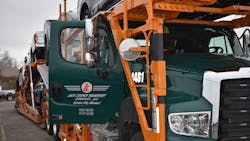Part of being involved in the incredibly interconnected automotive industry involves staying current. This is especially important with electric vehicles. Conversations surrounding EVs are constantly changing, and it can be difficult to keep up with all the trends and challenges.
Sarah Amico is an executive chairperson with Jack Cooper, a North American car haul company that has been around since 1928. Jack Cooper delivers finished vehicles for many auto manufacturers including General Motors, Toyota, Ford, Stellantis, and more.
“One of the things that we’ve learned over the last couple of years … even for a casual listener or reader of the news, you’ve seen the stories about our supply chains in this country not really [having] the resilience that we need in a 21st century economy,” Amico says. “I think that’s been particularly acute in the auto space, as we’ve seen the semiconductor chip shortage and certainly even parts and supply inputs shortages like rubber.”
As Jack Cooper approaches its 100th birthday, Amico says that part of her job is to think about maintaining the company’s success well into the future, even considering all the new vehicles that have been introduced since Jack Cooper’s founding.
“As you look at the multibillion-dollar investments all of our customers are making in the EV market, or some of our customers who are already in the EV market like a Tesla or Rivian,” Amico says. “We have to think about how that potentially could disrupt the supply chain anew.”
In finished vehicle logistics, an aspect of consideration with the influx of electric vehicle production is their weight.
“One of the things about electric batteries … is that they’re heavier,” Amico says. “They’re heavier than ICE engines, and in many cases, it’s a significant increase and weight.”
Amico predicts that, in the long run, technology will be developed to make these batteries lighter. She lists the already increased efficiency of electric vehicle charging and the increased lifespan of a vehicle’s charge as examples of developments in a similar vein. But for right now, heavy EV batteries bring about a unique challenge.
“It poses an interesting conundrum for the finished vehicle logistics supply chain in that we are currently limited by law to 80,000 pounds of weight on our rigs,” Amico says. “For [many] car haul companies, the way that their cost basis will work is largely fixed around per truckload.”
Amico says that independent of the number of units put on a truck, the cost base is fixed. She explains that the price per vehicle and the number of vehicles that can be put on a rig for each trip is called a load factor.
Amico says if vehicle weights increase substantially, this means the load factor will decline. As a result, cars could be more expensive to ship, and shipping times could be longer. But it also provides an opportunity to look at the problem through a regulatory and legislative lens.
“We're going to have to look at how to increase throughput as those vehicle weights increase, and one way to do that is to allow a minimal weight exemption for car haulers to carry more vehicles over short distances in a way that doesn't disrupt the supply chain again as EVs become more and more of the percentage of cars consumers are purchasing,” Amico says.
She points to a couple of examples such as a recent 2,000-pound weight exemption for natural gas-powered Class 8 trucks and zero-emission propulsion heavy trucks made by Congress. Additionally, she mentions an authorization by California Gov. Gavin Newsom in November 2021 that spearheaded an 8,000-pound weight variant for trucks leaving the port of California.
This is to say that Amico sees what work has already been done and believes that it is possible to keep the momentum going for car haul. She says that many car haulers drop one or two units within the first 100 to 150 miles, so a limit on the radius of a weight exemption in the first few 100 miles could be effective.
“A 4,000 to 8,000-pound weight variance would probably be enough to keep our supply chains really steady during the transition to EVs,” Amico says.
Amico says that legislative initiative could be a driving force for gaining momentum on weight exemptions.
“I really think that this has to be a legislative solution,” Amico says. “So, what we really need is the Transportation and Infrastructure Committee in the House and the Commerce Committee in the Senate to reach a point of view on how we're going to accommodate the increased weight of these vehicles.”
At the same time, Amico says that the car haul industry is not standing idly by. She says Jack Cooper has been working with car haul trailer designers to design proprietary rigs that remove excess weight while maintaining structural integrity.
“We’re not waiting on a white knight,” Amico says. “We’re helping ourselves, as we know this will be coming down the pipeline.”
Amico says in addition to these efforts, Jack Cooper has committed to becoming a carbon-neutral company. She says they’re proud to support their customers during the EV transition.
Simultaneously, Amico sees an opportunity in tackling weight limits that goes beyond the immediate need. Considering the driver shortage in the trucking industry, she believes that forming an approach to this current issue could act as a blueprint for approaching other challenges.
“Tackling this problem in the finished vehicle logistics supply chain by providing a weight exemption may well give us a template to safely solve the problem in trucking and logistics more broadly of how to tackle the driver shortage,” Amico says. “And I think that's a worthy endeavor.”
